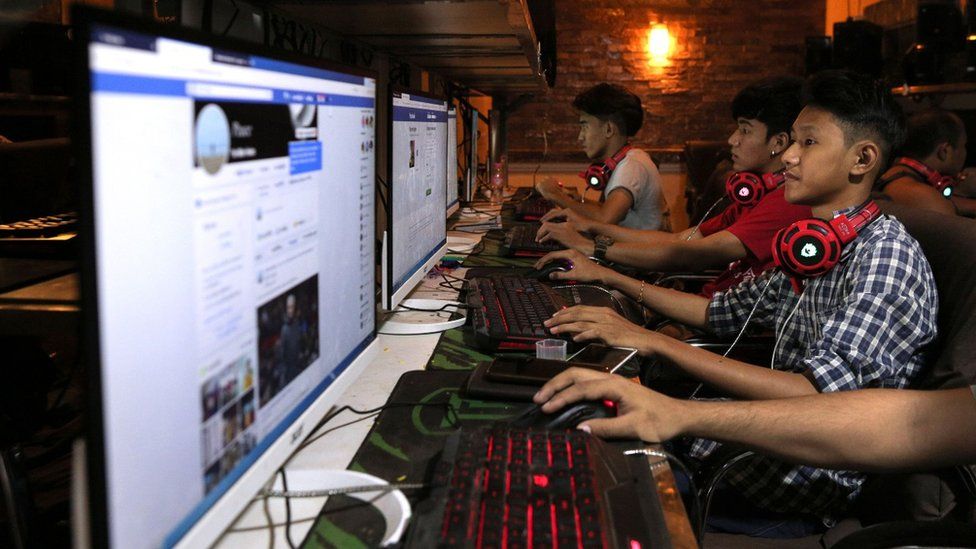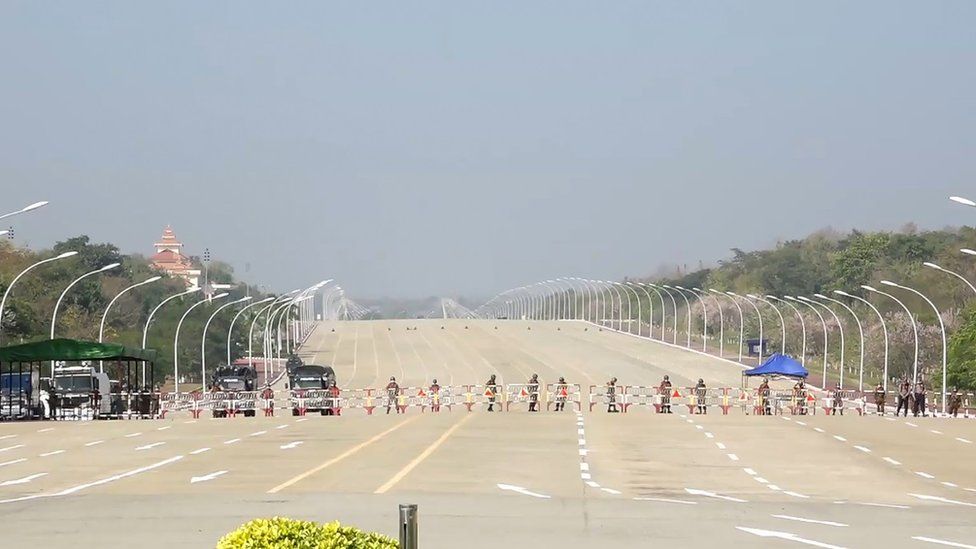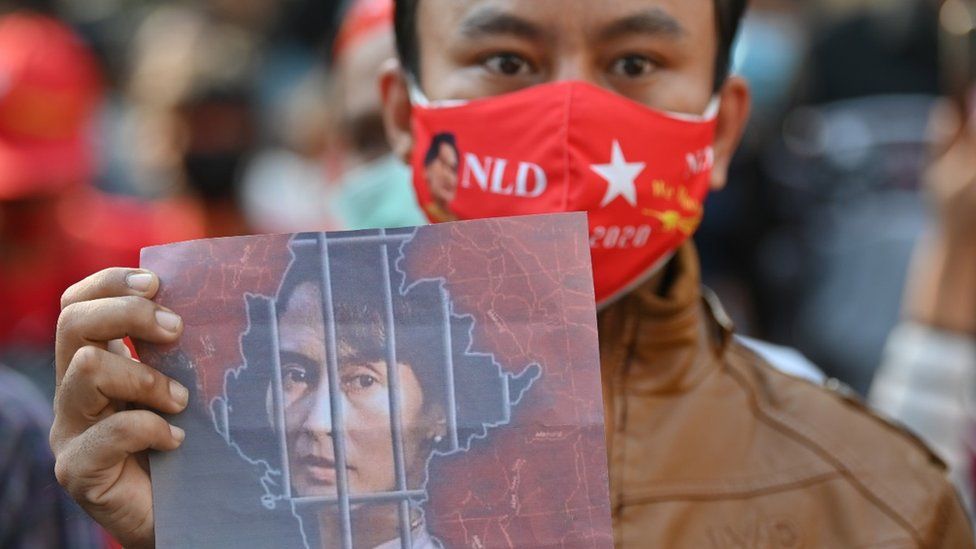Myanmar woke to the news on Monday that the military was seizing control of the country.
"I guess I'll be live tweeting a coup now," former Reuters journalist Aye Min Thant wrote on Twitter shortly before 07:00 local time (00:30 GMT).
"Things are still pretty quiet for now, though people are awake and scared. I've been fielding calls since 6am from friends and relatives. The internet is in and out and my sim card no longer works."
The takeover was announced in a statement aired on a military-owned television station.
It said the top army commander was in charge and a one-year state of emergency had been declared. The country's civilian leader, Aung San Suu Kyi, had been detained, along with other members of her National League for Democracy (NLD) party.
The move followed a landslide win by Ms Suu Kyi's party in an election in November that the army claims was marred by fraud. Ms Suu Kyi has urged her supporters to "protest against the coup".
Myanmar, also known as Burma, was ruled by the armed forces until 2011, when democratic reforms led by Ms Suu Kyi ended military rule.
One resident of Myanmar's main city, Yangon, told the BBC she was ready to head out for an early morning walk when she received a message from a friend telling her of Ms Suu Kyi's detention.
The 25-year-old, who asked not to be named for fear of reprisals, immediately logged on to social media.
"Waking up to learn your world has been completely turned upside down overnight was not a new feeling, but a feeling that I thought that we had moved on from, and one that I never thought we'd be forced to feel again," she said, reflecting on her childhood under military rule.
"What really hit me was seeing how our regional ministers were all detained. Because this meant that they really took everyone, not just Aung San Suu Kyi," she added.
The arrest of regional lawmaker Pa Pa Han was livestreamed on Facebook by her husband.
Political activists, including filmmaker Min Htin Ko Ko Gyi, were also reported to have been detained.
The Assistance Association for Political Prisoners (AAPP) in Myanmar told the BBC it had documented the arrests of at least 42 officials, and 16 civil society activists.
It said the process of verifying names was ongoing, while noting that some detainees had been released later in the day.
'Military cars roaming the city'
"We woke up with the news of the military coup in the early morning and some of our friends were detained," a local activist, who we are keeping anonymous, told the BBC's Newsday programme.
"The internet connectivity is not there anymore... I can't go out and use my phone, there is no data at all. This is what's happening right now. There are military cars roaming around the city," she said.
Local journalist Cape Diamond tweeted that in the capital, Nay Pyi Daw, there had been no signal from 04:00 to 11:15 local time. "No call, No Wifi," he later wrote on Twitter.

Myanmar's internet disruption
By BBC Reality Check
As the military took hold of power, internet disruption affected large areas.
The restrictions began at 03:00 on Monday local time. Internet connectivity dropped to 50% of normal levels of internet connectivity by 08:00.
The data shows disruptions impacting networks operators including state-owned Myanma Posts and Telecommunications (MPT) and an international operator Telenor, according to internet monitoring service Netblocks.
Netblocks say its findings indicate a "centrally ordered mechanism of disruption… progressing over time as operators comply".
By midday, internet connectivity appeared to be back up to 75%.
The Myanmar government has restricted the internet before, especially in areas in Rakhine and Chin states, where the army is fighting local groups.
Article 77 of Myanmar's Telecommunications Law passed in 2013 permits the government to cut off telecommunications during a national emergency.
However, human rights groups have called for the law to be amended to protect freedom of expression.

International and domestic TV channels, including the state broadcaster, went off air.
The bright red flags of the NLD were taken off of homes and businesses in Yangon.
"My neighbour just took down his NLD flag... The fear of violence is real," journalist and researcher Annie Zaman wrote on Twitter.
She later shared a video of a flag being removed at a local market.
Went out to local wet market and people are shopping as usual. Some were busy taking down NLD flags #video #bahan #myanmar
— Annie Zaman အန်နီ (@Natrani) February 1, 2021
I am told to turn on local TV at 9 am pic.twitter.com/OD8H843f32

People stocked up on essential supplies and queued at ATMs. Banks suspended services because of poor internet connections but said they would resume from Tuesday.
BBC Burmese Service journalist Nyein Chan Aye said the mood in Yangon was of "fear, anger and frustration".
He said that after rushing out to buy staple supplies, like rice, many people were staying indoors waiting to see what happens next.
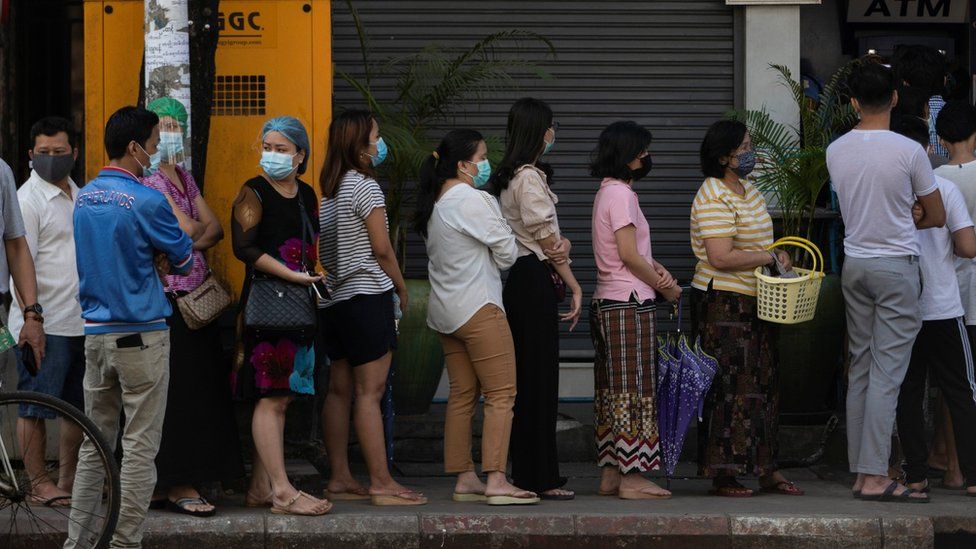
Climate of fear
It is been a tough time economically for many in Myanmar, and the arrival of a coup has had many fearing for basics.
Ma Nan, a trader in Yangon, told the BBC: "I'm worried if the price [of goods] will go up. I am worried because my daughter hasn't finished her school [education]. It's only halfway. Also this is the time of pandemic."
Than Than Nyunt, a housewife in Yanong, was also worried that the price of goods would rise and "people will revolt", adding "I hope that Aung San Suu Kyi and her colleagues will be freed sooner rather than later."
The fears are real if this coup means a return to the kind of life under the military rule of the 1990s and 2000s.
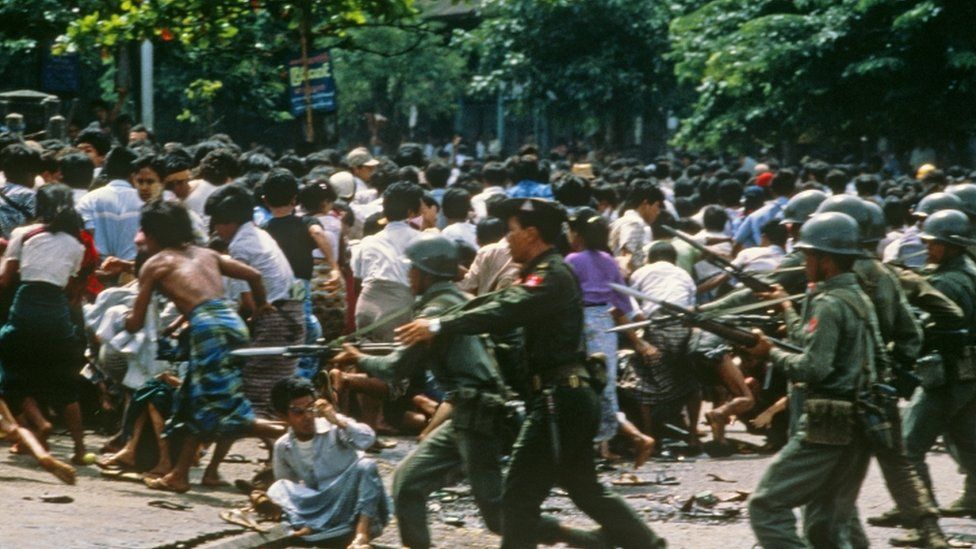
The military had staged a bloody coup in 1988, with thousands dying as a student-led uprising against a Soviet-style one-party rule was put down.
Ms Suu Kyi rose to prominence at the time and battled military rule and human rights abuses for two decades, after the military had refused to accept her election win of 1990.
Life was punctuated by corruption, fluctuating prices, repression of daily life, chronic malnourishment in some areas and ethnic strife in others. Many are now concerned about what will come next.
"We are currently trying to tell ourselves that we will move on because we've moved on from worse before," the 25-year-old in Yangon told the BBC. "But I wish we didn't have to do that, I wish we didn't have to tell ourselves to be strong."
'Street markets open'
Some military supporters, however, celebrated the coup, parading through the city blasting patriotic music.
Another caravan, this time a mix of monks and lay people, some dressed in camo. They are chanting for good health for General Min Aung Hlaing, commander of the armed forces of Myanmar. pic.twitter.com/G6IFhnqqnn
— Aye Min Thant (@the_ayeminthant) February 1, 2021

Griffin Hotchkiss, an American expat who has lived in Myanmar for about six years, said he saw a "caravan of pro-military civilians blasting loud music and 'celebrating' - while people (whom I know to be NLD supporters) on my street were visibly angry".
Some were surprised that the fallout was not more extreme.
On a trip into Yangon, Mr Hotchkiss said that "besides some army vehicles in the City Hall compound nothing looked out of the ordinary".
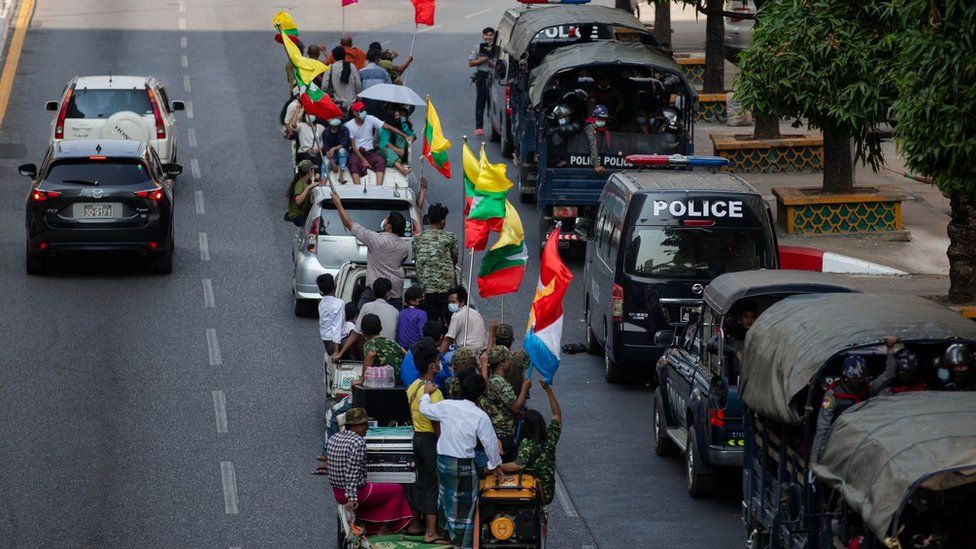
Later in the day, Mr Hotchkiss noticed that while there were "far fewer people", many shops appeared to be open and doing business.
Michael Ghilezan, who lives in Yangon with his Burmese wife, said he had "expected to see people marching down the streets in protests, and military vehicles stationed around the city. But none of that happened".
https://news.google.com/__i/rss/rd/articles/CBMiLmh0dHBzOi8vd3d3LmJiYy5jby51ay9uZXdzL3dvcmxkLWFzaWEtNTU4OTM3MzbSATJodHRwczovL3d3dy5iYmMuY28udWsvbmV3cy9hbXAvd29ybGQtYXNpYS01NTg5MzczNg?oc=5
2021-02-01 19:59:00Z
52781337950393






